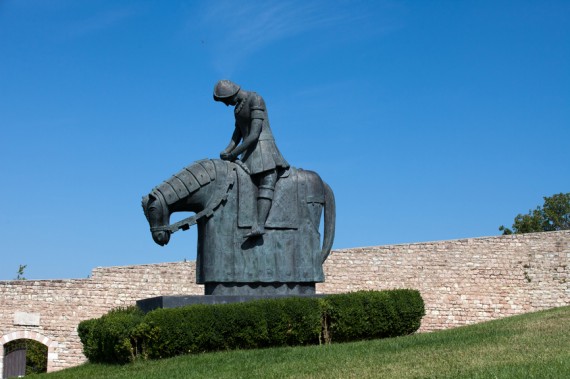
Knight of St. Francis – Assisi
This is a guest post by Jason Gaboury. He is the Regional Director of New York/New Jersey with InterVarsity. He directs and oversees the work of InterVarsity Christian Fellowship to undergraduates in that massive area!
The yellow edged paper on Mom’s desk had the words printed in elegant script. “Preach the gospel at all times, when necessary use words.” A thin script underneath identified St. Francis of Assisi.
The script, the hand, even the composition of the paper suggested a scriptorium, monks copying aphoristic sayings of the saints by candlelight.
More than two decades later I still think of this quote when I remember my mom. The phrase captured a way of being that extended beyond the pulpit and pastor’s desk of her small parish church. It propelled her into Habitat building projects, compelled her to visit the imprisoned, and made her a companion to the suffering.
Imagine my surprise to learn, after mom’s death, that this quote was something St. Francis never said. Often attributed to St. Francis, the quote above (along with several variants) doesn’t appear in print before the 1990s.
Why St. Francis?
Discovering this raised some questions for me. Why associate this quote with St. Francis in the first place? What is it about this quote that is so compelling that it so quickly became received as saintly wisdom? How should the ideas in this quote be appropriated?
It’s not difficult to imagine why this quote became associated with St. Francis. His life and legend encapsulate a radical commitment to follow Christ as literally as possible. Jesus said, “Take nothing for your journey…no bread, no bag, no money in your belts.” And Francis followed breadless, bagless, and moneyless. A quote as all engrossing as “preach the gospel at all times” fits the radical personality of St. Francis.
Additionally, St. Francis is well known for his innovative ways of communicating the gospel. He is the first to have organized a Christmas pageant, complete with live animals, as a way of communicating the story of Christmas to rural and largely illiterate people. So the sentiment seems to fit. “Preach the gospel always… use words occasionally.”
On the other hand, I’m not so sure Francis would have approved. His desire to embody obedient service to Christ was not in conflict with articulate preaching. Francis’ famous sermon to the birds is a telling case in point.
Traveling between two distinct preaching missions with two of his friars, Francis stopped to speak to a large group of birds in the woods. Francis said,
“My little sisters the birds, ye owe much to God, your Creator, and ye ought to sing his praise at all times and in all places, because he has given you liberty to fly about into all places; and though ye neither spin nor sew, he has given you a twofold and a threefold clothing for yourselves and for your offspring. Two of all your species he sent into the Ark with Noah that you might not be lost to the world; besides which, he feeds you, though ye neither sow nor reap. He has given you fountains and rivers to quench your thirst, mountains and valleys in which to take refuge, and trees in which to build your nests; so that your Creator loves you much, having thus favored you with such bounties. Beware, my little sisters, of the sin of ingratitude, and study always to give praise to God.”
This is quite a verbal exhortation! It was also an example to the brothers who were accompanying him. St. Francis was a master communicator. Might he have been modeling a robust verbal proclamation, one that even included birds?
Still, there is something compelling about this little aphorism. Almost 100 years after the social gospel/soteriological gospel split of the early 20th century this quote spoke to both sides of the divide. “Preach the gospel at all times” is a slogan that would fit within the world of evangelicalism. The emphasis in this part of the phrase is on preaching and gospel. There is an active engagement in the conversion of others. “When necessary use words” subverts this elevation of word over action and strongly suggests “actions speak louder than words.” This fits quite well within the mainline Protestant insistence on demonstrating faith by doing justice, establishing mercy ministries, and reserving judgment.
By holding these two clauses together, and by attributing itself to a catholic saint, our little phrase offers itself to the whole church. Yes to words. Yes to deeds. This is the wisdom of the church throughout the ages.
What Should We Do?
How might we appropriately apply the wisdom of this little phrase attributed to St. Francis?
A negative example is one I see from time to time among well meaning Christians. When challenged to become active participants in witness to their neighbors or in evangelism, this phrase is invoked. The sentences that follow often say things like, “I don’t really do evangelism. I like to…you know… just live my life… and be kind to people.” Or, “People who like evangelism are so pushy. I’d just rather let my life speak for itself.”
I’d never question the value of kindness or celebrate insensitivity. Still these examples misappropriate the phrase and misunderstand the saint to whom it is attributed. There are two reasons for this. First, kindness is not self-interpreting. If I help my neighbor carry in his groceries, he might think I’m a nice guy, a good neighbor, or buttering him up so that I can ask for a favor later. There is little, if any, hope that my neighbor will say, “You must be a follower of Jesus.”
The second reason this example misappropriates the phrase is that it under estimates the value St. Francis had for words. If St. Francis valued verbal preaching enough to include birds as hearers, I doubt it’s legitimate to appeal to him as the patron saint of ‘being nice’.
Integrity
A positive application of this aphorism would be an appeal to integrity, intentionality, and to evangelism as spiritual formation. This aphorism calls for an integrity between creed and deed. It is not enough simply to recite the creed on Sunday and live as a functional atheist the rest of the week. St. Francis’ radical commitment to follow Jesus as literally as possible continues to gain admirers and followers hundreds of years later. What would happen if ordinary Christians emulated his promiscuous generosity, truth telling, courage, and love?
Intentionality
Preaching the gospel in word and deed is not possible without intentionality. Gospel articulations abound. Tragically, many Christians are timid about articulating the gospel and find themselves unprepared when the opportunity comes to talk about it. A great step of intentionality might be learning a gospel outline and asking a friend over for coffee to talk about it. (I recommend one called the ‘four circles’ or the book Based on a True Story by James Choung, but there are plenty of great resources to choose from.) Another great step of intentionality is to think through the people you interact with during the day / week. Write their names down and pray for God’s blessing on them. You might pray a passage like John 16:8 and ask that you might have opportunity to talk with them about Jesus.
Spiritual Formation
While evangelism can often feel like a dirty word, I’d suggest that this little phrase helps us to engage it as a part of our spiritual formation. What if we took on the habit of praying every day for a month that we would find a creative means to ‘preach the gospel’ today? How would that shape us?
When opportunities present themselves, (and they will if we are willing to see them) what would happen if we’d already decided we would enter the awkward zone in a friends life offering prayer, blessing them, or asking about their spiritual background? These practices would shape us. Perhaps, if we did this over time, we might become people who could “Preach the gospel at all times… when necessary, use words”.
How does this post challenge you to not only live out, but speak the gospel?



It has been hard leaving the IV setting, being known for active participation in a Christian group and having proxe stations every month on campus. Now entering a larger world, with less encouragement, evangelism almost seems like it’s for radical people that love passing out tracts.
Yet I shouldn’t just pursue social justice and kindness to suffice as my witness; some direct discussion of who Jesus is and invitation might be needed…
Thank you, Jason
Thanks, Jason, for the encouragement to speak the good news we have received.
Considering the temper of our age, it may be time to replace the Franciscan attribution with Lesslie Newbigin’s wise words: “Words without actions are empty, but actions without words are dumb.”